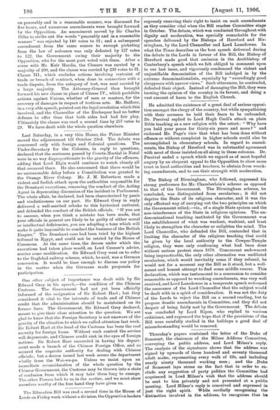The Bishop of Birmingham, who followed, expressed his strong preference
for Mr. Chamberlain's scheme as opposed to that of the Government. The Birmingham scheme, he concluded, was distinguished from secularism ; it did not deprive the State of its religious character, and it was the only effectual way of carrying out the two principles on which the Government relied,—viz., of a single State system and the non-interference of the State in religious opinions. The un- denominational teaching instituted by the Government was the establishment of what was weakest, washiest, and least likely to strengthen the character or enlighten the mind. The Lord Chancellor, who defended the Bill, contended that in limiting the character of the religious teaching that could be given by the local authority to the Cowper-Temple religion, they were only confirming what had been done without serious protest since 1870. Concurrent endowment being impracticable, the only other alternative was undiluted secularism, which would inevitably come if they refused, he would not for a moment say the Bill as it stood, but a well- meant and honest attempt to find some middle course. This declaration, which was tantamount to a concession to consider reasonable as opposed to wrecking amendments, was very well received, and Lord Lansdowne in a temperate speech welcomed the assurance of the Lord Chancellor that the subject would be dealt with in a spirit of consideration. It was not the duty of the Lords to reject the Bill on a second reading, but to propose drastic amendments in Committee, and they did not despair of being fairly met by the Government. The debate was concluded by Lord Ripon, who replied to varioue criticisms, and expressed the hope that if the provisions of the Bill were carefully studied in the holidays a good deal of misunderstanding would be removed.


































 Previous page
Previous page